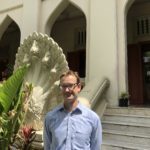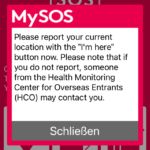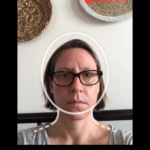Photos below right: David on the campus of Chulalongkorn University in Bangkok; screenshots of the MySOS quarantine monitoring app; Celia answering a video call to confirm her location.
Photos © David M. Malitz and Celia Spoden
Project start in quarantine and Freiburg:
Interview with Celia Spoden & David M. Malitz
October 7, 2021, by Torsten Weber
We are very happy to welcome our first two new researchers since the beginning of the pandemic: Celia Spoden and David M. Malitz. While Celia has recently arrived in Tokyo, David is working from Freiburg for the time being and is looking forward to moving to Japan soon.
Where are you right now and how are you?
Celia: I have just arrived in Tokyo and I am in quarantine for two weeks. On the one hand, it’s a good way for me to familiarise myself with my new project and recover from my jet lag and the turbulent last few weeks in Hanover. On the other hand, I really want to get out. I’d like to go jogging or swimming, meet friends and really arrive in Tokyo.
David: We moved from Bangkok to Freiburg at the beginning of August and we are looking forward to going to Japan at the end of the year. In the meantime, I’m working my way into my new project. I am also teaching a course on modern Thailand at Freiburg University. After several years in Bangkok, we are happy about the autumn weather here in Freiburg.
When was the last time you were in Tokyo and what was the occasion?
David: In the summer of 2019, I gave lectures in Thai Studies at Waseda University and Osaka University – and spent a week with my family in Kyoto. Unfortunately, I was unable to take up a Japan Foundation Short-term Fellowship in summer 2020 due to the pandemic.
Celia: For me, it was even longer ago. I was a guest researcher at the DIJ at the beginning of 2018. At the time, I had a travel grant from Heinrich Heine University in Düsseldorf, mainly for literature research for my project on the possibilities of social participation for people with amyotrophic lateral sclerosis (ALS).
What annoys you most about the pandemic?
Celia: The travel restrictions and the unexpected complications that came with it. They cost me a lot of nerves and made things difficult in the last few weeks when I moved to Tokyo. In Hanover, I had to contact several test centres until I found one that would fill out the MHLW’s COVID form for me. Getting a visa also involved a lot more effort than usual. In Tokyo, I am not yet able to look for a flat. I am temporarily staying in an Airbnb flat. Getting from the airport to the quarantine flat wasn’t easy either because I didn’t know the difference between a taxi, which I’m not allowed to use, and a hired car, which I am allowed to use. Now in quarantine I have to report my health status daily, send my GPS location and usually get a video call. It is annoying because it’s an invasion into my privacy. I’m looking forward to deleting the apps in a few days.
And how has the pandemic affected you?
David: In Thailand, the authorities responded to the pandemic quickly and decisively in early 2020 – but unfortunately this did not prevent strong third and fourth waves. Libraries and archives were closed repeatedly and for a long time. And homeschooling also required additional parental involvement.
What are you looking forward to most in your first weeks in Tokyo and at the DIJ?
David: I am looking forward to getting my hands on Japanese sources again. They were inaccessible to me for a long time. And I look forward to meeting new colleagues and reuniting with old acquaintances.
Celia: For me, too: seeing many familiar faces again and meeting friends. And eating delicious food!
How would you explain your new research project to a layperson in just one sentence?
David: I want to explore how Japan has contributed to and influenced “health infrastructures” in Southeast Asia, both in the historical development of institutions and their cultural structures.
Celia: My project is about digital technologies such as avatars that enable people to work who cannot leave the house due to physical limitations; I will investigate whether these developments bring new freedoms and risks such as new forms of social exclusion or an obligation to work and a reduction of social benefits.
Which three hashtags would best describe your research projects?
Celia: #telework, #cyberphysicalspaces, #society5.0
David: #Japan, #ASEAN, #healthinfrastructures
Would you mind sharing with us your favourite place in Japan that you want to visit as soon as possible?
David: Ama-no-Hashidate in Kyoto Prefecture, but not before spring.
Celia: Oh, there are several. I lived in Kichijoji/Inokashira for a while. There are many places there like cafes, restaurants, izakayas and of course the park where I will go once the quarantine is over. Another favourite place is Okinawa. I studied there and would like to visit friends there as soon as possible.
Interview by Torsten Weber.



